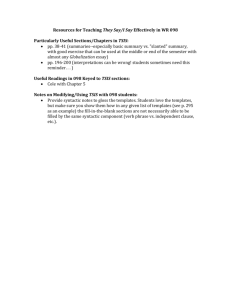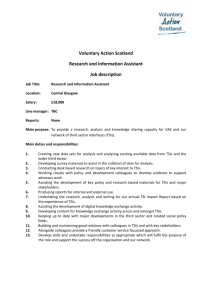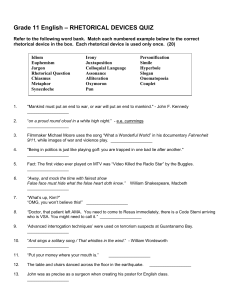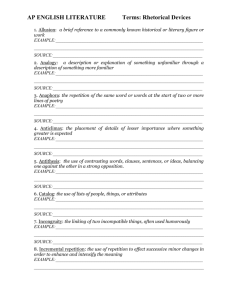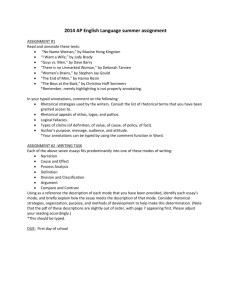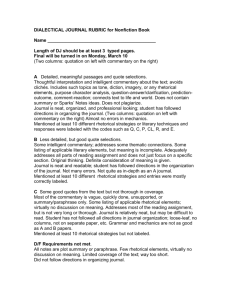ENGL101H Syllabus - University Honors
advertisement
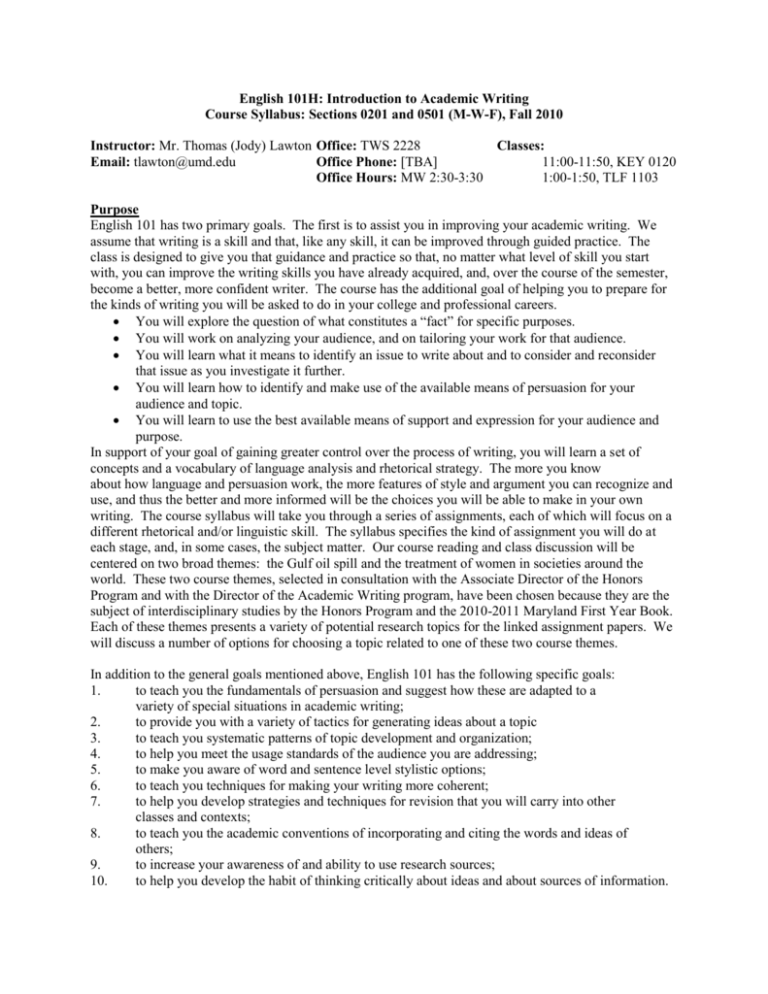
English 101H: Introduction to Academic Writing Course Syllabus: Sections 0201 and 0501 (M-W-F), Fall 2010 Instructor: Mr. Thomas (Jody) Lawton Office: TWS 2228 Email: tlawton@umd.edu Office Phone: [TBA] Office Hours: MW 2:30-3:30 Classes: 11:00-11:50, KEY 0120 1:00-1:50, TLF 1103 Purpose English 101 has two primary goals. The first is to assist you in improving your academic writing. We assume that writing is a skill and that, like any skill, it can be improved through guided practice. The class is designed to give you that guidance and practice so that, no matter what level of skill you start with, you can improve the writing skills you have already acquired, and, over the course of the semester, become a better, more confident writer. The course has the additional goal of helping you to prepare for the kinds of writing you will be asked to do in your college and professional careers. You will explore the question of what constitutes a “fact” for specific purposes. You will work on analyzing your audience, and on tailoring your work for that audience. You will learn what it means to identify an issue to write about and to consider and reconsider that issue as you investigate it further. You will learn how to identify and make use of the available means of persuasion for your audience and topic. You will learn to use the best available means of support and expression for your audience and purpose. In support of your goal of gaining greater control over the process of writing, you will learn a set of concepts and a vocabulary of language analysis and rhetorical strategy. The more you know about how language and persuasion work, the more features of style and argument you can recognize and use, and thus the better and more informed will be the choices you will be able to make in your own writing. The course syllabus will take you through a series of assignments, each of which will focus on a different rhetorical and/or linguistic skill. The syllabus specifies the kind of assignment you will do at each stage, and, in some cases, the subject matter. Our course reading and class discussion will be centered on two broad themes: the Gulf oil spill and the treatment of women in societies around the world. These two course themes, selected in consultation with the Associate Director of the Honors Program and with the Director of the Academic Writing program, have been chosen because they are the subject of interdisciplinary studies by the Honors Program and the 2010-2011 Maryland First Year Book. Each of these themes presents a variety of potential research topics for the linked assignment papers. We will discuss a number of options for choosing a topic related to one of these two course themes. In addition to the general goals mentioned above, English 101 has the following specific goals: 1. to teach you the fundamentals of persuasion and suggest how these are adapted to a variety of special situations in academic writing; 2. to provide you with a variety of tactics for generating ideas about a topic 3. to teach you systematic patterns of topic development and organization; 4. to help you meet the usage standards of the audience you are addressing; 5. to make you aware of word and sentence level stylistic options; 6. to teach you techniques for making your writing more coherent; 7. to help you develop strategies and techniques for revision that you will carry into other classes and contexts; 8. to teach you the academic conventions of incorporating and citing the words and ideas of others; 9. to increase your awareness of and ability to use research sources; 10. to help you develop the habit of thinking critically about ideas and about sources of information. Required Texts: Crowley, Sharon, and Debra Hawhee. Ancient Rhetorics for Contemporary Students. 4th ed. New York: Pearson, 2009. [ISBN: 978-0-205-57443-8] Graff, Gerald, and Cathy Birkenstein. They Say/I Say: The Moves that Matter in Academic Writing. 2nd ed. New York: Norton, 2010. [ISBN: 978-0-393-93361-1] Hacker, Diana. A Pocket Style Manual. 5th ed. Boston: Bedford/St. Martin’s, 2009. [ISBN: 978-0-31259324-7] Kristof, Nicholas, and Sheryl WuDunn. Half the Sky: Turning Oppression into Opportunity for Women Worldwide. New York: Vintage, 2009. [ISBN: 978-0-307-38709-7] Williams, Joseph M. Style: The Basics of Clarity and Grace. 3rd ed. New York: Pearson, 2009. [ISBN: 978-0-205-60535-4] Online Course Content We will use the Blackboard system to access online content related to the course. You can access the system at this URL: <http://elms.umd.edu>. In order to log in to the system, you need to use your Directory ID (not your university ID number—the Directory ID is usually based on your name) and directory password. You should check this site regularly between class periods to see if any announcements about the class have been posted. Course Outline This syllabus is subject to change. Any changes will be announced in class, and students are responsible for keeping up with such changes. NOTE ON RELIGIOUS HOLIDAYS: It is the student’s responsibility to inform the instructor in advance of any intended absences for religious observances. You must give me specific notice in writing about planned religious observances by the end of the schedule adjustment period (September 13), or such absences will be counted among your six allowed discretionary absences. ABBREVIATIONS: (M) = Monday (T) = Tuesday (W) = Wednesday (Th) = Thursday (F) = Friday (S) = Saturday August 30 (M): Introduction to the Course Syllabus and Course Policies, to be distributed DUE: Information Sheet (distributed in class) September 1 (W): Academic Writing: Argument and Rhetoric DUE: Writing Self-Assessment (handout) “Ancient Rhetorics” (ARCS 1-43) “Introduction: Entering the Conversation” (TSIS 1-14) September 3 (F): Academic Writing: Conversation and Commentary (continued) Assignment Sheet for Commentary Paper (handout) Introduction to Half the Sky (xi-xxii) “‘I Take Your Point’: Entering Class Discussions” (TSIS 141-144) “‘What’s Motivating This Writer?’: Reading for the Conversation” (TSIS 145-55) September 6 (M): NO CLASS: LABOR DAY HOLIDAY 2 ARCS = Ancient Rhetorics (BB) = Blackboard TSIS = They Say/I Say September 8 (W): The Rhetorical Situation: Writing for an Audience DUE: Starter Essay “Kairos and the Rhetorical Situation” (ARCS 44-70) Half the Sky, chapters 1 and 2 (3-45) “‘So What? Who Cares?’: Saying Why It Matters” (TSIS 92-100) September 10 (F): Summary and Commentary Half the Sky, chapter 3 (47-60) “‘They Say’: Starting with What Others are Saying” (TSIS 19-28) “‘Her Point Is’: The Art of Summarizing” (TSIS 30-40) ***NOTE: Monday, September 13, is the last day for Schedule Adjustment (Drop/Add) *** September 13 (M): Grading Standards; Draft Workshop Practice Readings on Grading Criteria and Academic Dishonesty (BB) September 15 (W): Draft Workshop: Audience and Arrangement DUE: Two printed copies of your Commentary rough draft (INCLUDING rhetorical situation) September 17 (F): Style and Grammar Workshop Williams, Lessons 1, 3, and 4 (1-7 and 26-54) September 20 (M): Draft Workshop: Style and Formatting (bring a printed copy of the rough draft of your Commentary paper) September 22 (W): DUE: COMMENTARY PAPER Rhetorical Analysis Assignment Sheet for Rhetorical Analysis Wiki (BB) “Logical Proof” (ARCS 158-194) September 24 (F): Rhetorical Analysis (continued) “Ethical Proof” (ARCS 195-245) “The Ethics of Style” (Williams 132-151) September 27 (M): Rhetorical Analysis (continued) “Pathetic Proof” (ARCS 246-266) ARCS 419-427 September 29 (W): Inquiry and Evidence DUE: Invention materials for Rhetorical Analysis Wiki (posted to BB) Assignment Sheet for Inquiry Paper (BB) October 1 (F): Using Sources and Engaging with Them “‘As He Himself Puts It’: The Art of Quoting” (TSIS 42-50) Hacker, section 30 (110-115) 3 October 4 (M): Library Day (meet in McKeldin Library, room 6101) DUE: Brainstorming Keywords Exercise (BB) “Identifying and Selecting Research Resources” (BB) “Memory: The Store-House of Invention (ARCS 374-404) Hacker, sections 26-27 (93-102) “Identifying Periodical Types” and “Periodical Comparison Chart” (BB) “Evaluating Books and Periodicals” (BB) October 6 (W): Using Sources and Engaging with Them (continued) “‘Yes/No/Okay, But’: Three Ways to Respond” (TSIS 55-67) October 8 (F): Using Sources with Academic Integrity “‘And Yet’: Distinguishing What You Say from What They Say” (TSIS 68-75) Academic Integrity links (BB) October 9 (S): DUE: Rough Draft of Rhetorical Analysis Wiki Essay Posted by noon October 11 (M): Using Sources with Academic Integrity (continued) Hacker, section 29 (107-109) October 12 (T): DUE: Upload the rough draft of your Inquiry paper to BB by noon October 13 (W): Draft Workshop Conferences for Inquiry Paper DUE: Worksheet comments for your group’s drafts October 15 (F): Style Work: Voice and Ethos in Academic Writing “‘Ain’t So/Is Not’” (TSIS 121-128) Williams, Lesson 2 (8-25) ARCS 405-419 October 16 (S): DUE: FINAL REVISIONS OF RHETORICAL ANALYSIS WIKI POSTED ON BLACKBOARD BY NOON October 18 (M): Style Workshop DUE: Bring a hard copy of your rough draft of your Inquiry Paper October 20 (W): DUE: INQUIRY PAPER The Research Project Assignment Sheet for Stasis Grid/Research Proposal (BB) “Stasis Theory” (ARCS 71-116) October 22 (F): The Research Project (continued) October 25 (M): CLASS CANCELLED FOR CONFERENCES NOTE: All students will have individual conferences during this week (October 25-29) to discuss research topics. To be prepared for your conference, you should complete the “Identify and Select Resources” and “Choosing Databases” Exercises (available via Blackboard), and bring these, along with a rough draft of your Stasis Grid, to the conference. 4 October 27 (W): CLASS CANCELLED FOR CONFERENCES October 29 (F): CLASS CANCELLED FOR CONFERENCES November 1 (M): From Inquiring to Arguing a Position DUE: Revised Draft of Stasis Grid Assignment Sheet for “Considering Another Side” Paper (BB) November 3 (W): Developing Logical Support for a Position “The Common Topics and the Commonplaces” (ARCS 117-157) “Lines of Argument” (BB) November 5 (F): Developing Logical Support for a Position (continued) DUE: REVISED STASIS GRID AND RESEARCH PROPOSAL PAPER “Extrinsic Proofs” (ARCS 267-291) ***NOTE: Monday, November 8, is the last day to drop the course with a “W.”*** November 8 (M): Developing Argument Paragraphs “‘As A Result’: Connecting the Parts” (TSIS 105-118) Williams, Lessons 5 and 6 (55-78) November 9 (T): DUE: Upload your “Considering Another Side” draft to BB by noon November 10 (W): Draft Workshop Conferences for “Considering Another Side” DUE: Worksheet comments for your group’s drafts November 12 (F): Style: Sentence Emphasis and Figures of Speech “Style: Composition and Ornament” (ARCS 327-373) November 15 (M): Style Workshop DUE: Bring a hard copy of your “Considering Another Side” draft November 17 (W): DUE: CONSIDERING ANOTHER SIDE PAPER Arguing a Position in a Full Research Paper; Responding to Opposing Views Assignment Sheet for Final Position Paper (BB) ‘Skeptics May Object’: Planting a Naysayer in Your Text” (TSIS 78-90) November 19 (F): Responding to Opposing Views (continued) November 22 (M): Workshop on Responding to Opposing Views November 24 (W): Organizing a Position Paper “Arrangement: Getting it Together” (ARCS 292-326) November 26 (F): NO CLASS: THANKSGIVING RECESS November 29 (M): Metadiscourse and Metacommentary “‘In Other Words’: The Art of Metacommentary” (TSIS 129-137) Williams, Lesson 7 (79-90) 5 November 30 (T): DUE: Upload the rough draft of your Final Position Paper to BB by noon December 1 (W): Draft Workshop Conferences for Final Position Paper DUE: Worksheet comments for your group’s drafts December 3 (F): Draft Workshop Conferences for Final Position Paper DUE: Worksheet comments for your group’s drafts December 6 (M): Style: Sentence Structure DUE: Full Rough Draft of Paper #4 (including rhetorical situation) Williams, Lessons 8 and 9 (91-131) December 8 (W): Draft Workshop: Style, Grammar, and Formatting December 10 (F): DUE: FINAL POSITION PAPER Honing Rhetorical Skills Throughout Your Academic Career Course Evaluations, to be distributed Final Wrap-up Names and Phone Numbers/Email Addresses of Classmates You are responsible for keeping up with the syllabus and course content even if you are absent. Therefore, you should exchange contact information with at least three classmates so that you can reach them in the event that you miss a class and need to catch up. 1. 2. 3. 6
